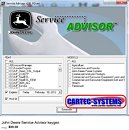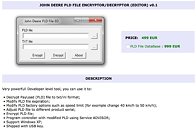Friday, March 24th 2017
Jailbreaking American Tractors with Ukrainian Firmware
Tractors are some of the most beloved and benign pieces of automotive technology, and some of the very first applications of the internal combustion engine, after cars. Tinkering with the classic free-breathing (natural aspiration) engines of old tractors is something arguably every mechanical engineer has ever done. Over the ages however, tractors and other farm equipment have gotten increasingly complex. The engines became smaller (and hence more fuel-efficient), and technologies such as turbochargers and electronic fuel injection shored power and torque back up to the levels of larger free-breathing engines. Running the engine is now handled by a small embedded computer called the ECU (engine control unit). Likewise, running the various ancillaries on farming equipment such as harvesters have been governed by electronics. The more there's electronics, the less there is that a spanner can fix, and that has become a big problem in America.
Some popular farm equipment manufacturers such as John Deere have taken greed cleverly disguised as "quality assurance" to the same levels as the Apple iPhone. On the iPhone, you can't just install third-party software that hasn't been vetted by Apple and distributed through the App Store. Free software activists have criticized this for stiffing innovation, because Apple's software doesn't give users unrestricted access to the hardware that they've paid for. John Deere and some of its competitors are in the same league. They've outfitted their tractors and farm equipment with electronics that make it practically impossible to perform "unauthorized" repair. If your crop is up for harvest and your harvester is throwing a fit, you have no option but to take it back to a John Deere service center, or other repair shops "authorized" by the company. If you've replaced a part yourself, a guy with a laptop has to come over to your farm, and "activate" that part. American farmers aren't taking kindly to this, and help is coming from the most unlikely of places.Back in October 2016, John Deere made its customers sign a license agreement to purchase their equipment, which forbids unauthorized repair or modification; and prevents farmers from suing the company for "crop loss, lost profits, loss of goodwill, loss of use of equipment … arising from the performance or non-performance of any aspect of the software (driving the equipment)." This presents an existential threat to farmers, as their livelihoods are at the mercy of receiving product service from only one source (manufacturer and its licensed shops), and prevents them from fixing the equipment on their own, should they go down at an inopportune time.
Here's what's wrong. John Deere wants to control the supply of spare parts for its products. Each time you replace a major part (eg: the transmission case), the part change has to be updated onto the ECU. The ECU is connected all major components of the tractor, and stores a table with their electronic serial numbers. When a part is replaced, its serial number has to be registered with the ECU, so it can validate that a genuine John Deere part has been installed. Trouble is, this validation costs some serious dime - John Deere charges $230, plus $130/hr for an "authorized mechanic" to drive into your farm and validate the part by plugging in the ECU to a laptop with the validation software.Activists are pushing state-level legislation in the US state of Nebraska, that invalidates John Deere's agreements, and grants farmers the "right to repair" their equipment. In the meantime, farmers are taking to the Internet, for a Ukrainian custom firmware available on certain Eastern European invite-only, paid online forums. Farmers can flash the ECU and other electronics of their farm-equipment with this custom firmware, which effectively jail-breaks them, making them easier to repair. This has sprung up an entire industry of ECU modding equipment and unauthorized software, which isn't free, but is a must-have for any farmer. The key-generator that spits out part-validation keys goes for $99, firmware PayLoad (PLD) file encryptor/decryptor, which gets through John Deere's encryption, goes for $499, and cables that plug your tractor to a PC, for about $80. They may seem expensive and perhaps even predatory, but for farmers who intend to run their tractors for over a decade, it's a windfall in long-term savings.
This brings back the classical debate about whether you truly own the hardware of a $1000 iPhone, and if not, why not. When farmers pay hundreds of thousands of dollars for their farm equipment, shouldn't they completely own it, and use/repair it as they please? Or has purchasing a tractor become purchasing a service rather than a product? Tell us in the comments below.
Source:
Vice
Some popular farm equipment manufacturers such as John Deere have taken greed cleverly disguised as "quality assurance" to the same levels as the Apple iPhone. On the iPhone, you can't just install third-party software that hasn't been vetted by Apple and distributed through the App Store. Free software activists have criticized this for stiffing innovation, because Apple's software doesn't give users unrestricted access to the hardware that they've paid for. John Deere and some of its competitors are in the same league. They've outfitted their tractors and farm equipment with electronics that make it practically impossible to perform "unauthorized" repair. If your crop is up for harvest and your harvester is throwing a fit, you have no option but to take it back to a John Deere service center, or other repair shops "authorized" by the company. If you've replaced a part yourself, a guy with a laptop has to come over to your farm, and "activate" that part. American farmers aren't taking kindly to this, and help is coming from the most unlikely of places.Back in October 2016, John Deere made its customers sign a license agreement to purchase their equipment, which forbids unauthorized repair or modification; and prevents farmers from suing the company for "crop loss, lost profits, loss of goodwill, loss of use of equipment … arising from the performance or non-performance of any aspect of the software (driving the equipment)." This presents an existential threat to farmers, as their livelihoods are at the mercy of receiving product service from only one source (manufacturer and its licensed shops), and prevents them from fixing the equipment on their own, should they go down at an inopportune time.
Here's what's wrong. John Deere wants to control the supply of spare parts for its products. Each time you replace a major part (eg: the transmission case), the part change has to be updated onto the ECU. The ECU is connected all major components of the tractor, and stores a table with their electronic serial numbers. When a part is replaced, its serial number has to be registered with the ECU, so it can validate that a genuine John Deere part has been installed. Trouble is, this validation costs some serious dime - John Deere charges $230, plus $130/hr for an "authorized mechanic" to drive into your farm and validate the part by plugging in the ECU to a laptop with the validation software.Activists are pushing state-level legislation in the US state of Nebraska, that invalidates John Deere's agreements, and grants farmers the "right to repair" their equipment. In the meantime, farmers are taking to the Internet, for a Ukrainian custom firmware available on certain Eastern European invite-only, paid online forums. Farmers can flash the ECU and other electronics of their farm-equipment with this custom firmware, which effectively jail-breaks them, making them easier to repair. This has sprung up an entire industry of ECU modding equipment and unauthorized software, which isn't free, but is a must-have for any farmer. The key-generator that spits out part-validation keys goes for $99, firmware PayLoad (PLD) file encryptor/decryptor, which gets through John Deere's encryption, goes for $499, and cables that plug your tractor to a PC, for about $80. They may seem expensive and perhaps even predatory, but for farmers who intend to run their tractors for over a decade, it's a windfall in long-term savings.
This brings back the classical debate about whether you truly own the hardware of a $1000 iPhone, and if not, why not. When farmers pay hundreds of thousands of dollars for their farm equipment, shouldn't they completely own it, and use/repair it as they please? Or has purchasing a tractor become purchasing a service rather than a product? Tell us in the comments below.




53 Comments on Jailbreaking American Tractors with Ukrainian Firmware
My dad had 2 cars of him letting modify the ECU which increased HP, wonder if they do this tweaking as well.
Looks like all of our decades old (all the way to the 70s) tractors will continue to stay in service. Also, newer john deere's are POS and they can't even repair them properly.
That clause directly infringes on the consumer rights here in Europe, and at least in Norway the EULA comes after the local laws, meaning that something like the HumancentiPad or other less extreme cases gets culled.
if someones proprietary corn cross-pollinates with your regular corn field, you must now pay them and only use their corn from that point on or grow no corn at all.
you want that 1200$ riverbed? it's going to cost 10,000$ in licensing to make it work. ANNUALLY
tell me that isn't bait and switch?
used car? blue book 2000$, major component replacement cost? 5000$
poor? have trouble paying? we'll make your payments 2x what you can afford because you're poor...
rich? we'll make your payments 1/4 of what the poor guy pays every month.
everything here is setup that way.
'Merica F Yeah!
"Of Course Its Based on Windows 10 software so its ultra Reliable and always up to Date and as such will require an always on Internet Connection"
what you don't have Broadband Internet here let me hook you up with comcast/AT&T Contract for $200 a month(Special price for farmers )
your need it as the Vehicle needs to be online to use our software before you can use it to work.
May need to add an order of magnitude to that: www.rdoequipment.com/used-equipment?search:eq_salesgroup=Agriculture#.WNVTM2jyuy0
tankstractors and have whats left of the EU start legal Challangesand in the meantime America loses Sales and much more
The same applies to many things as Deere and many other companies are building CAN BUS universal control modules that fit many applications so they can capitalise on economy of scale.
I'm not condoning their actions, and I think a customer should be able to fuck it up if they want, but they should lose their warranty.
I also know JD is not the first to do this kind of thing, a few Truck manufacturers tried this and failed. Some even partnered with Cummins and Detroit Diesel to put hooks into the engine ECMs that forced repairs only at authorized dealers, because Cummins want direct access, thru dialup to a trucks ECM, in an attempt to even bypass authorized dealers from making computer repairs and "adjustments". The failure of this plan was that even us techs could not adequately diagnose engines and Alison automatics. Know that JD found a way to make that work like this you have to give them props for being bigger a****oles than Cummins.